
In the age of AI, constant advertising, and fake news, a genuine relationship with your audience is your most valuable business asset.
This is why starting an online community is among the best ways to grow your online course sales.
But an online community without user engagement is as good as a supercar without fuel, a computer without internet, or a lifejacket without air (you get the point, right?)
So, how do you increase your online community engagement and use it to drive sales for your coaching programs, online courses, and digital products?
In this article, we’ll discuss several proven ways you can turn your online community into your members’ happiest place on the internet.
Let’s dive in.
Why Is Online Community Engagement Important For Your Business?
An engaged online community can be the biggest source of marketing, leads, and sales for your e-learning business. It allows your prospective clients and existing customers to directly interact with you and get value from your feedback.
This increases your credibility and positions you as a genuinely caring expert ready to help others grow.
I’m not saying this without evidence.
A recent study by Global Web Index found that both Gen Z and Millenials trust online communities more than dedicated review sites for product recommendations.
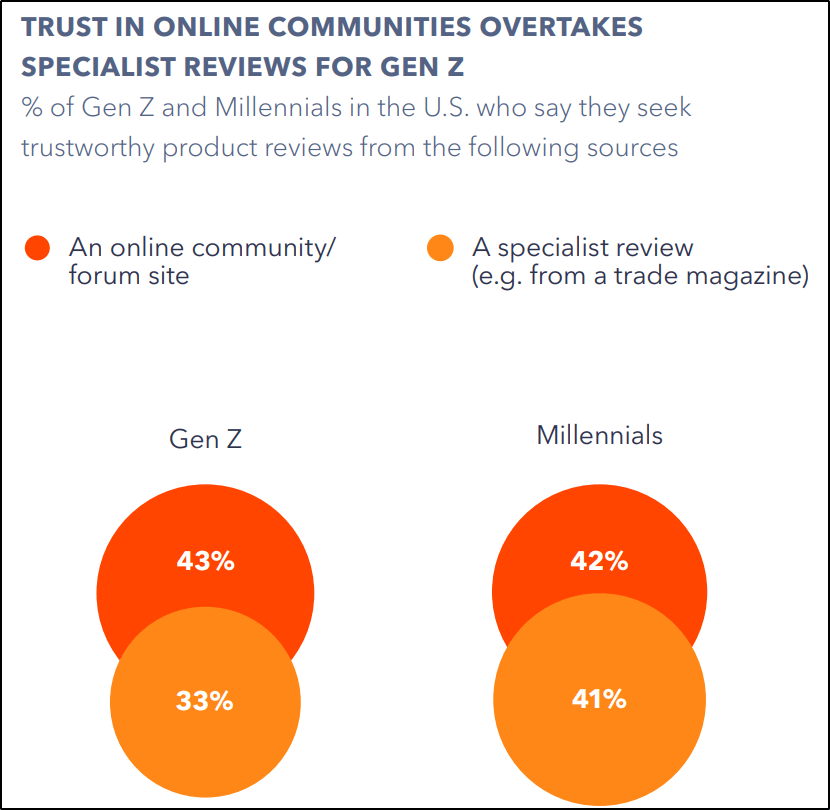
This is why numerous eLearning businesses leverage the power of online communities to drive sales.
For example, Nerd Fitness, one of the most popular websites on fitness and weight loss, has a free Facebook community of over 96K members.
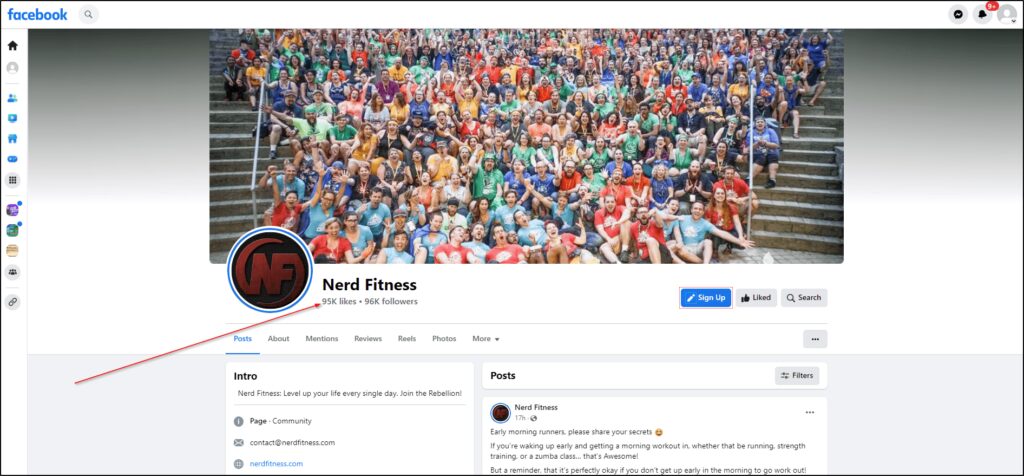
Thousands of Nerd Fitness followers interact with each other through this community, solve problems, share success stories, and spread its content across the web.
It also generates dozens of monthly customers for Nerd Fitness courses and paid coaching programs.
Why? Because the members trust Nerd Fitness because of its large and helpful community and feel it’s the best place to buy fitness courses.
You can replicate this in any niche or industry by building a helpful community around your online courses and eLearning programs.
16 Best Practices To Increase Online Community Engagement
Let’s now discuss practical ways to increase user engagement in your online community and use it to increase brand awareness, leads, and sales.
Community Engagement Tip #1: Choose The Right Online Community Platform
What has your online community platform got to do with user engagement? Everything, in my experience.
The right online community platform gives you the features, control, and flexibility to create content in different ways, organize your community how you want, and make it accessible to your users across device types.
For example, Circle.so is a leading online community platform designed for online course sellers. It allows you to create multiple online communities, organize discussions through channels and threads, hold one-on-one coaching calls, collect payments, and engage your members using polls, assignments, and multimedia content. (Read our complete Circle review.)
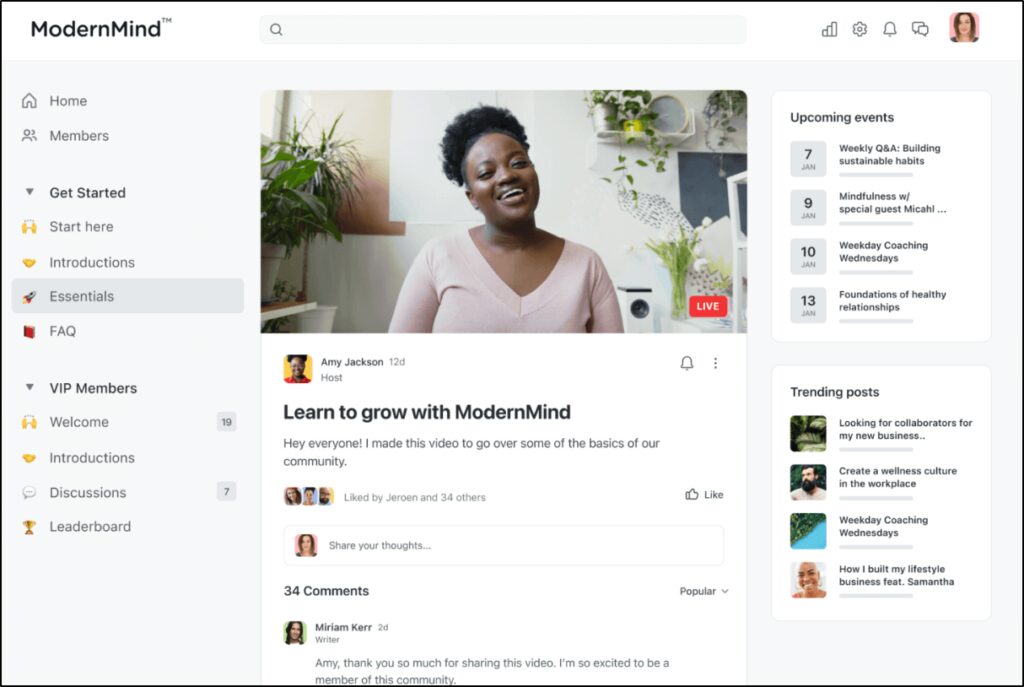
Pat Flynn, a leading internet marketer, and podcaster, uses Circle.so for his paid online communities in his flagship program SPI Academy.
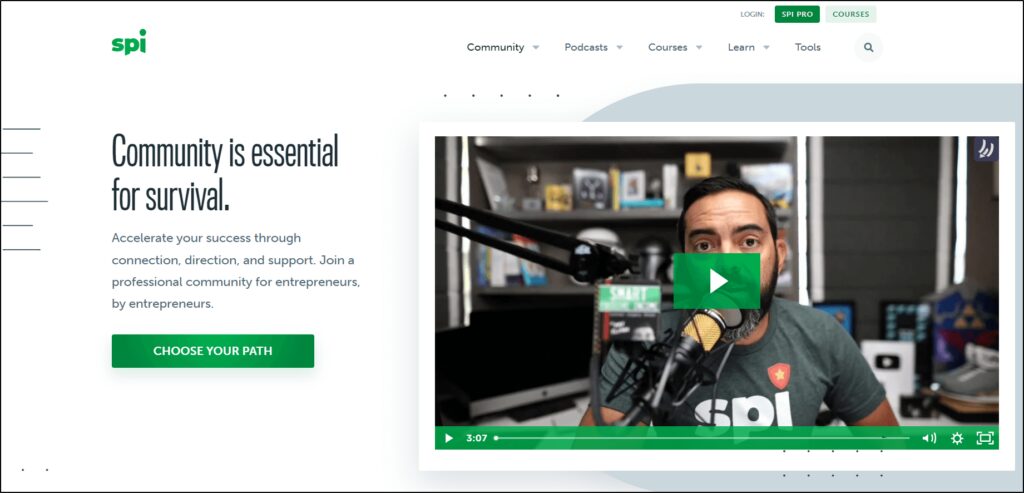
Mighty Networks is another robust community platform offering numerous features to engage your members, build a vibrant community, and drive course sales. (Read our full Mighty Networks Review).
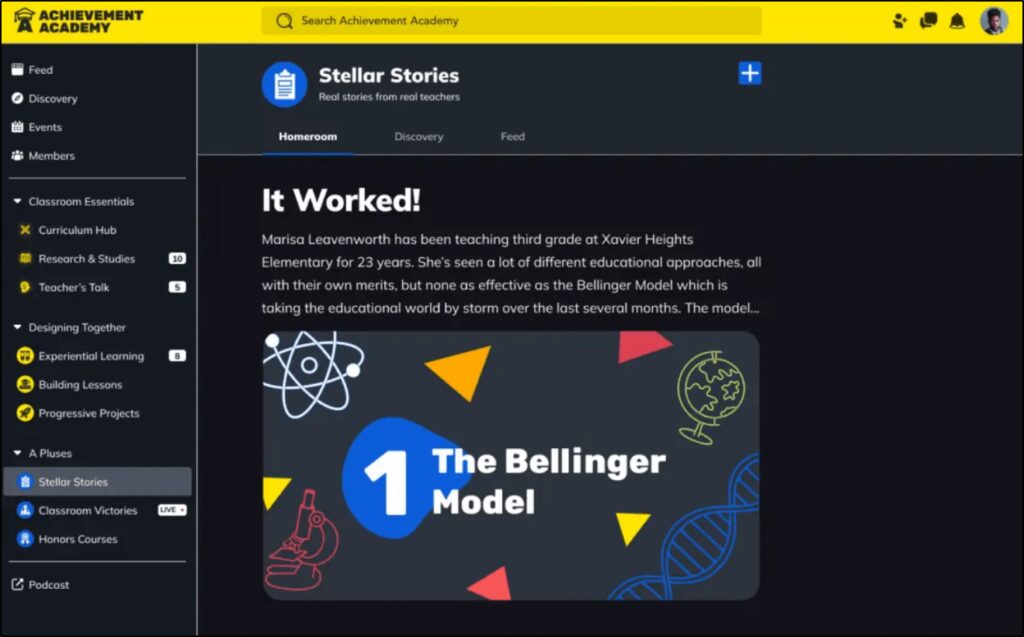
Both these platforms seamlessly integrate online communities with online courses and digital products. But if you’re new, you can start with a Facebook Group or a channel on Slack or Discord, although these platforms aren’t ideal for selling digital products.
Ultimately, you’d want to move to a premium community platform because it reduces friction in your funnel and helps you easily convert users into leads and customers.
Community Engagement Tip #2: Assign A Full-Time Community Manager
If you want to turn your online community into a growth engine for your business instead of a time-sucking chore, you must hire a dedicated online community manager.
Don’t worry! You can find one on a freelance platform like Upwork or Fiverr without spending a fortune. For example, here’s a list of service providers I found on Upwork by searching “online community managers”.
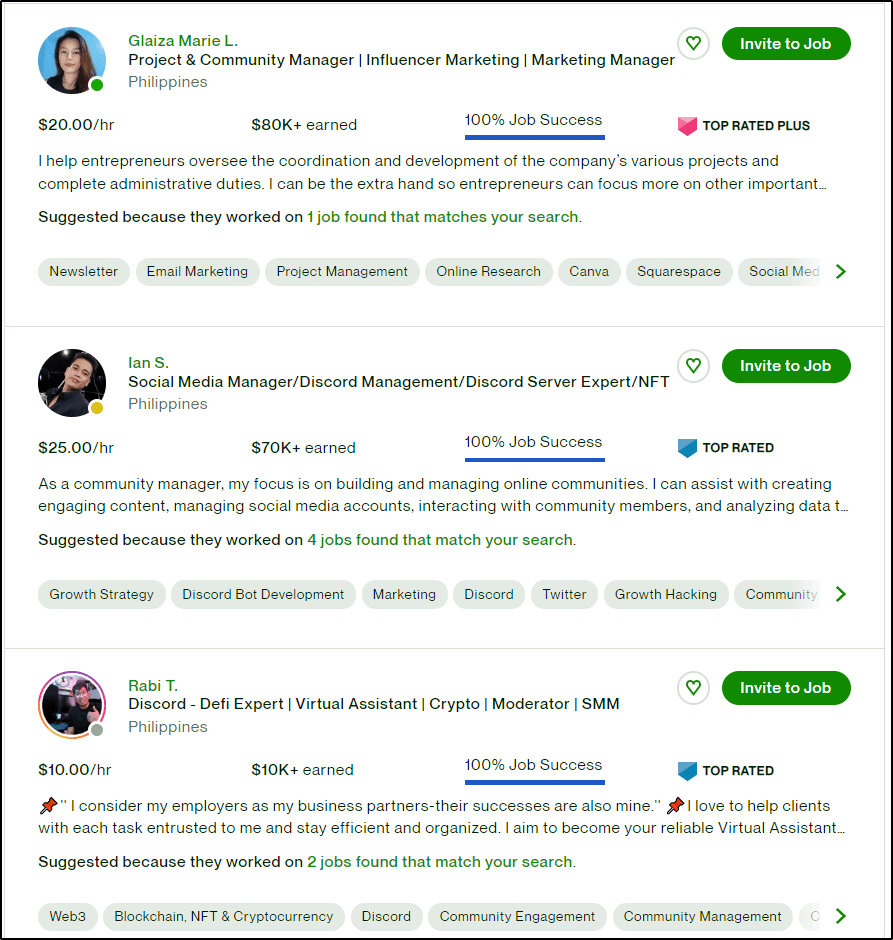
This small investment would not only save your time but also play a vital role in boosting your online community engagement.
So what’s the job of an online community manager?
They’re a dedicated resource responsible for managing your community, starting new discussions, moderating content, launching new content themes, and ensuring that your community plans are perfectly executed.
So, unless you’re really tight on budget, don’t skip this step.
Community Engagement Tip #3: Create Different Community Programs
This one is critical for engaging your online community members.
People usually hesitate to initiate conversations in online communities unless you provide them with directions or an agenda.
So, as a community owner, you can help them by designing various one-time and recurring programs for your community.
For example, you can have a weekly Q&A session where you answer questions from community members about anything related to your niche.
This would encourage your members to speak up even if they’re introverts knowing that the Q&A session is designed to address their problems.
Similarly, you could have monthly live group calls in the community giving your members a chance to directly interact with you live.
Many communities also have promotional days where the members can share their latest work, small wins, client testimonials, or anything else to enhance their reputation.
I’ve also seen online communities that invite one of their members every month to hold a live session with other members to share their knowledge in a specific area.
For example, in a graphic design community, you might have a typography expert among your members who could share their experience and practical tips with your audience.
Such activities make your members feel a part of the community, increase their engagement, and improve the overall value of your group.
Community Engagement Tip #4: Use Monthly Content Themes
If you want your community members to stay interested in your content and have FOMO about your community, keep coming up with new monthly content themes.
A content theme defines the broader focus of your community for a specific month.
For example, you could declare January as the productivity month, where you and all the members would make an intentional effort to be more productive in their work. To achieve it, you can share your productivity routines and expert advice.
You can also ask your community members to share their routines and how they achieve the desired productivity despite their daily life challenges.
Similarly, you could declare February as the networking month where all your members would consciously go out, meet new people, and grow their professional network.
Such activities and themes help your members focus and stay interested in your community because you’re always doing something new and interesting.
Community Engagement Tip #5: Reward Active Members
Research shows that rewards increase human motivation to achieve goals and strengthen their bond with the rewarding entity.
This is why acknowledging your most active community members and rewarding them in different ways acts as a catalyst for increasing your online community engagement and encouraging other members to speak up more frequently.
How do you execute this strategy?
You could define an engagement criterion members must fulfill to qualify for a reward. For example, you could set a minimum requirement for
- The number of monthly posts by a member.
- Helpful posts that other members upvote
- Answering questions from other members
- Initiating new conversations
- Sharing something valuable that members upvote
You can define reward levels for your members so that a member stays motivated to achieve the next level by fulfilling its criterion.
Every level should have different rewards. For example, you could
- Give them additional community privileges such as more promotional posts, voice messages, or unlimited direct access to mentors.
- Assign achievement badges that appear with their messages and help them stand out in the community.
- Prioritize their questions in Q&A and live calls.
- Offer discounts on your courses and digital products.
- Offer discount coupons for different online tools.
You must keep the rewards challenging without making them unattainable to maintain your members’ interest. If you strike the right balance, your rewards system can be your biggest community engagement driver.
Community Engagement Tip #6: Regularly Publish Exclusive Content
Nothing makes your community members feel more special than creating content exclusively for them that no one from outside can access.
In fact, a recent study found that accessing exclusive information is among the top reasons people join online communities.
So what type of exclusive content are we talking about?
For online communities, actionable videos with step-by-step guidelines to achieve something are the most popular content format. Combine them with worksheets and templates to make them more valuable and easier to implement.
Take your members behind the scenes and show them the “How” part of things instead of talking about “What” all the time. For example, if you’ve successfully built a huge email list and talked about it publicly, show your community members how you did it.
Similarly, if you talk about branding, SEO, digital marketing, or any other topic publicly without sharing the specific details of how to accomplish a task, your community is the place to do it so that your members feel you’ve over-delivered value and stay subscribed to your group longer.
Community Engagement Tip #7: Create A Safe And Open Environment
If you want your community members to openly express their views without the fear of bullying, discrimination, or ridicule, you must create a safe learning environment where everyone supports each other.
This is crucial because if even one of your community members feel unwelcome in your community and fear being labeled by other members, they’ll not only stay silent but will probably leave your community soon.
So, how do you create a safe environment in your community? By announcing it in clear words and repairing it often.
Make it absolutely clear that you’ve built your community to support people, help them learn, and progress in their lives. So, everyone is welcome to ask questions, share feedback, and seek guidance without fear.
Show zero tolerance for any violations so that your members feel safe.
Community Engagement Tip #8: Have Fun
If you want to build lasting connections with your members, you must make your community a fun place to hang out.
A study by researchers at the University Of Western Sydney, Australia, found a direct impact of fun activities and social games on student learning levels. They found that learning programs that involved games and fun group activities were more effective in transferring knowledge to students.
I’m not saying you should crack jokes or share memes all the time. But keep the tone light, laugh often, and encourage members to have fun.
For example, some communities celebrate pet days where members post their pets’ pictures and stories that make everyone laugh.
Celebrate birthdays, have watch parties, organize virtual get-togethers, and share hobbies. All of this strengthens the connection between your community members, increases their engagement levels, and keeps them hooked to your community, not just for your content but also for their connections.
Community Engagement Tip #9: Publicize Successful Members
Want to motivate your community members to take action and make progress? Celebrate small wins and publicize your successful members. Announce milestone achievements, share success stories, and make heroes out of your members.
Russell Brunson, the ClickFunnels founder, regularly features success stories in his Facebook community and allows his successful members to showcase their work.
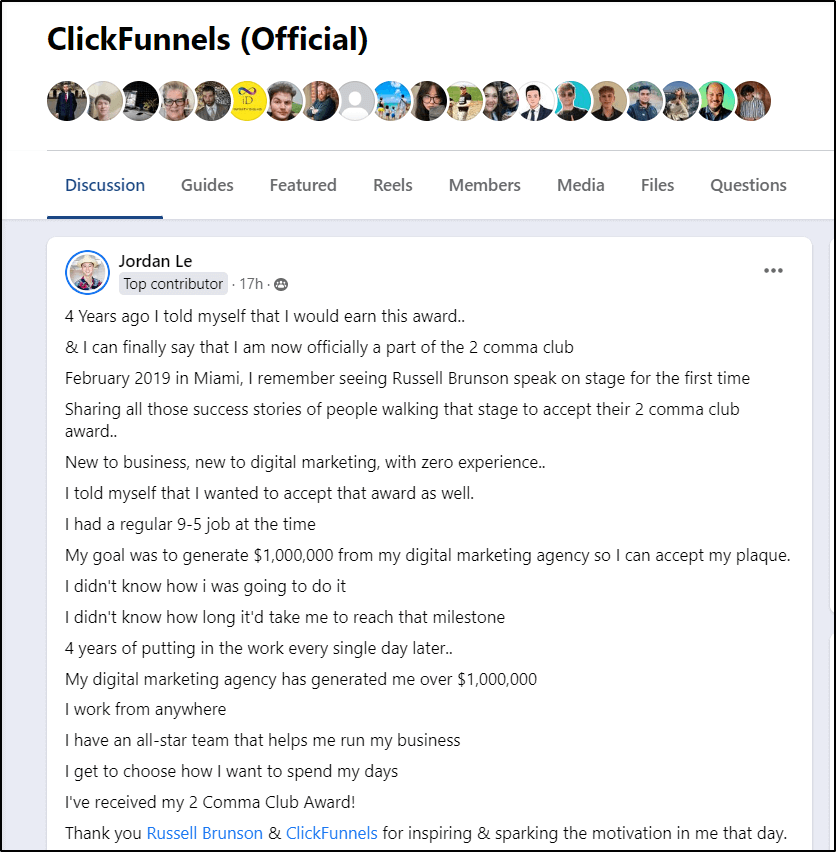
PeakFreelance, a free community for freelance writers, has a dedicated channel for celebrating member success.
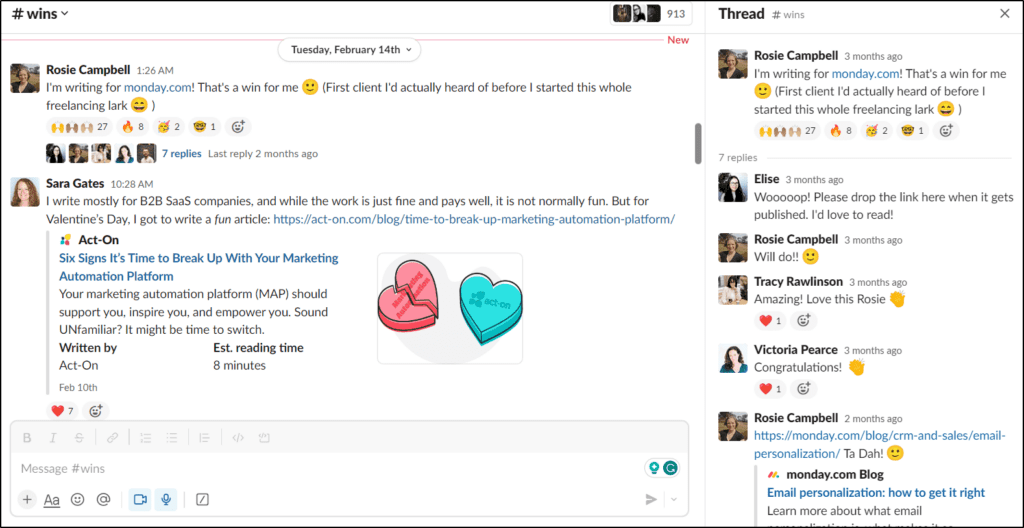
This not only motivates your successful members to aim higher but also becomes an inspiration for others in the community. As a result, more people in your community take action, implement your strategies, and achieve results.
For example, if you teach SEO in a closed community, celebrate when a community member publishes a high-quality article, lands a major guest posting gig, or gets a backlink from a high-authority site. Congratulate them on your main community channel and get them on a live group call with other members to learn how they achieved those results.
Community Engagement Tip #10: Make Leaders From Your Community
One of the best ways to grow your community’s influence and engagement is by getting your most active members on board to build a leadership team.
Grow your community and reduce your workload by gradually delegating your tasks to your most successful members. For example, they could lead discussion groups, host live calls, create new content, and mentor new community members.
In other words, you’ll move into a higher mentorship role while your leadership team takes care of the community.
They’ll do this with your approval, of course.
But this would allow you to provide more value to your members without burning out yourself.
Marie Forleo’s B-School is an excellent example of this approach.

Much of Marie’s current team consists of her previous community members who stood out for their work ethic and results. As a result, she elevated them to leadership positions within the community resulting in greater productivity and more value for the members.
Community Engagement Tip #11: Use Threads And Channels To Organize Discussions
As your community grows and more members start different messaging, it can quickly get messy and difficult for people to navigate the discussions.
And you know what happens when there’s confusion? People stop interacting with your community, and engagement levels plummet.
To avoid this, organize your community discussions by creating threads, channels, and hashtags (like this Slack community).

This way, every community member knows where to go to find relevant information or post a new message. It also makes it easier for members to follow new conversations and respond to messages without getting overwhelmed.
Community Engagement Tip #12: Give Members A Sense Of Purpose
Most people join online communities to learn something, achieve specific goals, and have meaningful conversations with others.
However, having a sense of belonging and contributing to a higher cause are other prominent reasons users cite for joining communities.
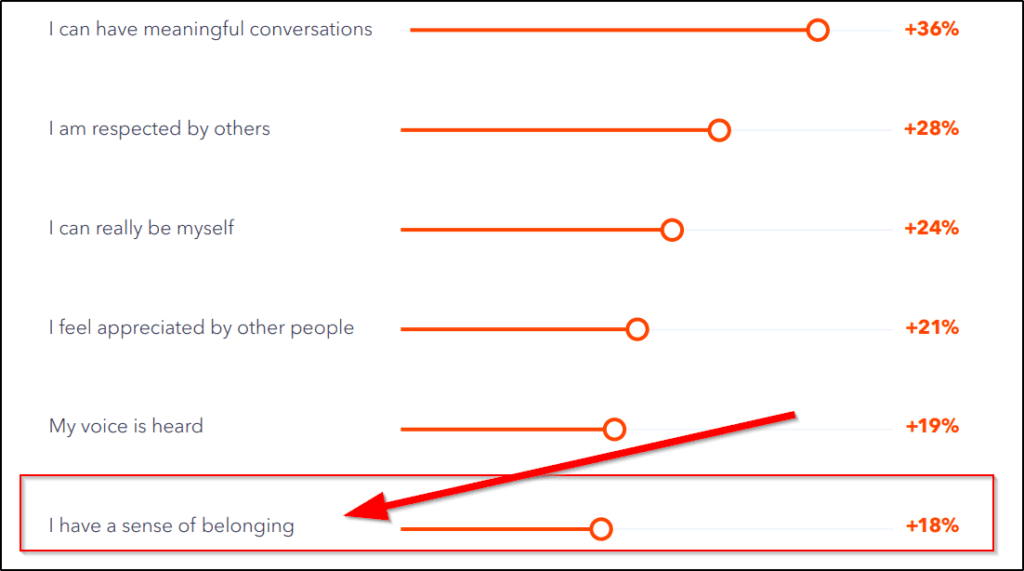
This is why your online community should offer more than just a bunch of solutions or business problems. It should stand for something greater and have a bigger purpose that motivates your members and makes them feel they’re making an impact.
It doesn’t always have to be philanthropy or social work, either.
For example, a community of content marketers can be driven by the fact that they want to mainstream ethical marketing where the consumers are not deceived or forced into taking action. Instead, brands use educational content to genuinely persuade their customers.
Similarly, a community of musicians can aim to use their skills to build bridges between cultures and communities and help people get closer to each other to resolve conflicts.
As a community owner or host, you must clearly define the impact you want your community to have. Don’t sell your community just on the basis of your content. Show your prospects they can make a bigger impact by joining your community and strengthening your cause.
This not only keeps your members engaged but also helps you retain them longer.
Community Engagement Tip #13: Run Surveys
Running a successful and engaged community means you must regularly seek feedback from your members to understand their needs and gauge their interests.
You can do that by analyzing your most popular discussion threads and frequently discussed problems.
But running periodic surveys and asking specific questions can also help you learn a great deal about your community’s immediate needs and how they feel about different subjects.
You’ll find the polls option in most online community platforms. For example, here’s a screenshot from a Mighty Network community.
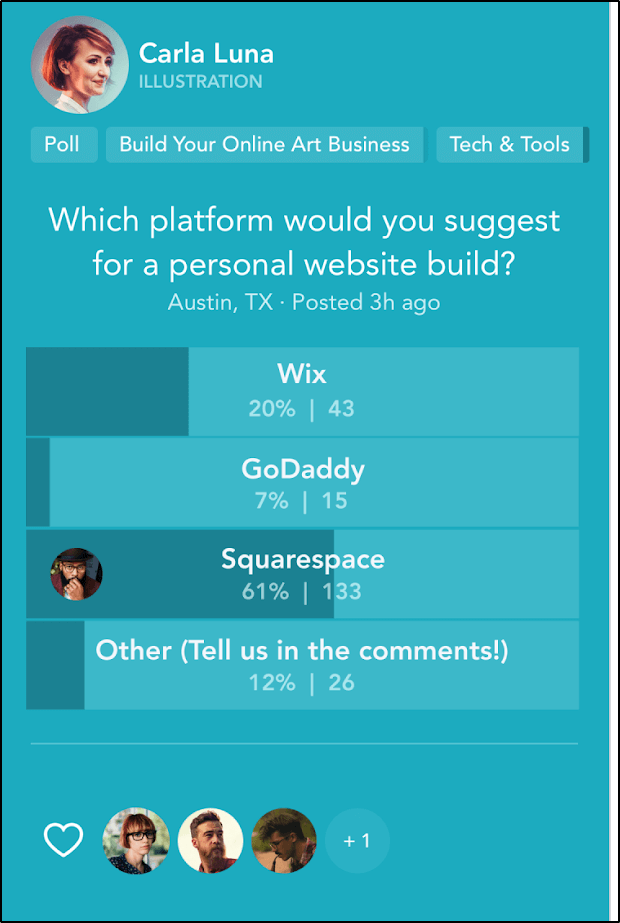
Running polls gives audience insights and boosts engagement by showing users that their opinion matters.
Community owners most commonly use polls to:
- Understand audience problems
- Come up with new content ideas
- Celebrate theme days
- Get event ideas
- Decide on content delivery format
However, don’t go overboard with polls and only use them when you need real insights that you can’t get from any other source because too many polls not only result in lower responses but might also make you appear unsure about your stuff.
Community Engagement Tip #14: Invite Guests
As the community host and owner, you’re the expert everyone looks up to. But you can’t be an authority on everything in your niche, even if you’ve done it all.
For example, as an SEO expert, you might specialize in link building and content creation but not be as proficient in technical SEO.
This is when inviting relevant guests and subject matter experts is an excellent way to provide value to your audience and keep them hooked to your content.
It makes your community feel they’re getting bonus content just because they’re a part of your group. And they’re right.
Because most experts who show up as guests in your community only do so because of your authority and community size. They wouldn’t talk about those topics directly to your community members.
In return, they get exposure to their businesses and enhance their reputations.
So, it’s a win-win.
For example, Joanna Wiebe of CopyHackers regularly invites other successful copywriters specializing in different facets of the copywriting business.
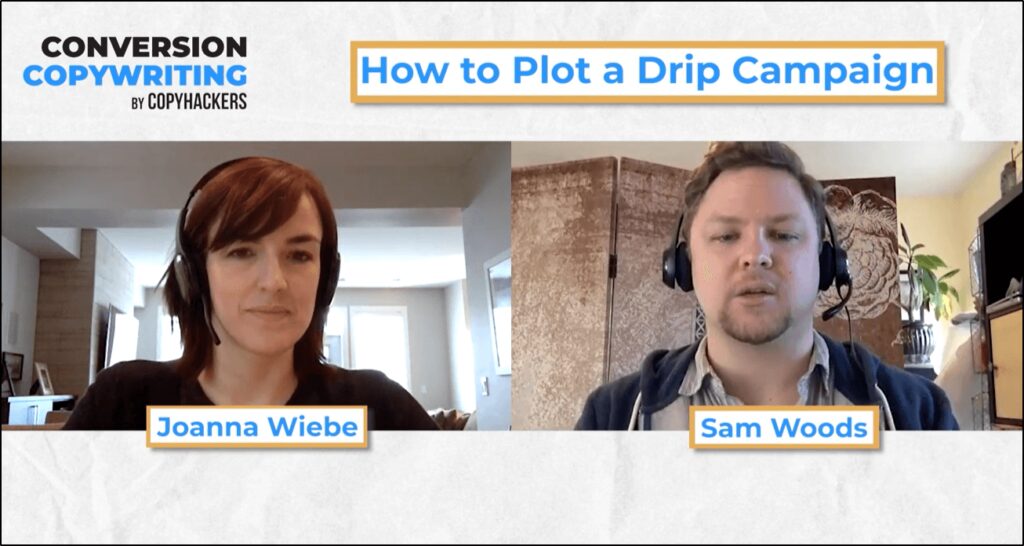
Apply this to any niche you want.
So, let’s say you run a fitness community and specialize in the keto diet. But to provide more value to your members, you can invite a weight trainer, a fasting specialist, or a general dietitian for an interview.
Community Engagement Tip #15: Run Community Challenges
Want to energize your community, make them take action, and produce lots of testimonials and success stories?
Run a challenge.
Let me explain.
Community challenges are activities where your community members pursue specific targets individually or in groups.
They’re time-sensitive targets which mean anyone who signs up for a challenge must complete it before the deadline.
Challenges work so well because of the herd effect, where people feel compelled to do something everyone else does.
So, for example, if you’re a YouTube coach helping people create engaging content, you could run a 30-day video challenge where your participants must create a video every second day without caring about their fluency, appearance, or any other excuses.
Or you could do a 1000-word per day challenge as a writing coach to help your students beat writer’s block and get used to creating tons of content.
Community Engagement Tip #16: Hold Offline Events
Online communities, connections, and friends are great. But nothing builds relationships faster than real-world interaction.
When people meet each other in person, have fun together, and discuss their challenges, they often create lasting bonds that help them make real progress in their lives and businesses.
This is why holding real-world networking events and meetups is among the most effective ways to build a closely-knit community and boost user engagement.
If you have a large community with members worldwide, you can hold meetups in multiple locations.
But if you run a local group or a community focused on a specific region, having an annual meetup where everyone comes in is a great way to build a sense of ownership in your community and grow your influence.
How Do You Plan To Increase Your Online Community Engagement?
Starting an online community is easy.
But engaging, managing, and growing a community takes time, effort, and careful planning. You must remain patient and consistently create high-quality content to keep your audience engaged.
Plus, you must give them an open and free environment where they can share their problems and seek guidance.
It takes work, but the ROI of an engaged online community outweighs the challenges of growing it.
Let me know if you have questions.
Table of Contents


